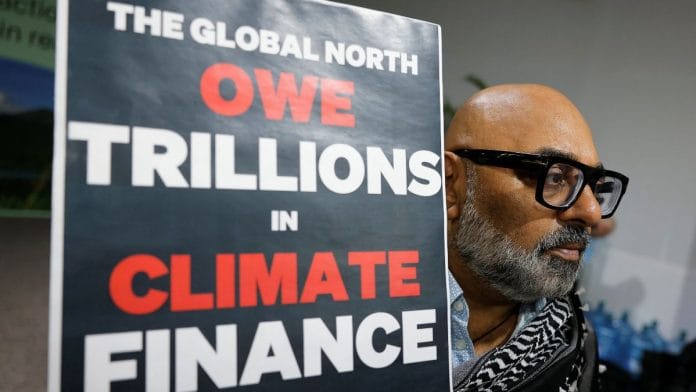One of the biggest challenges facing participants at the ongoing COP29 Summit in Baku, Azerbaijan—a country rich in gas and oil, which contribute significantly to fossil fuel and greenhouse gas emissions—is discussing the potential impact of Donald Trump’s election as the 47th President of the United States. New Delhi, which is not represented by top-tier leadership like the Prime Minister or the environment minister, has taken the lead in emphasising that COP29 should focus on pragmatic climate action and a strong, sustainable climate finance protocol, known as the New Collective Quantified Goal, besides establishing an enforceable accountability framework and protecting vulnerable populations. The pledge of around $100 billion by developed nations is embarrassingly short of the proposed NCQG target of trillions.
Facilitated by the United Nations Framework Convention on Climate Change (UNFCCC), the COP summits are rooted in the 1992 global treaty that aims to combat the negative consequences of climate change. However, the COP summits have achieved precious little in meeting the goals of the 2015 Paris Agreement, particularly in keeping global warming below 1.5 degrees Celsius above pre-industrial levels.
In a significant move, COP29 approved a set of new regulations for carbon markets, allowing trade in carbon credits. While this will help those emitting less to earn and profit from carbon credits, there are doubts about benefits for emerging economies, which require greater manufacturing processes and advanced infrastructure to compete with the developed nations. Carbon credits might help reduce emissions in consumer-driven economies but may not benefit those heavily dependent on manufacturing.
Also read: Why you shouldn’t count on Donald Trump to end the wars
Trump brings uncertainty back
Unlike the Kyoto Protocol, adopted in 1997 and enforced in 2005, which mandated emissions reductions solely from developed countries, the Paris Agreement requires all countries to reduce emissions. Although US Vice President Al Gore inked the Kyoto Protocol in 1998 during Bill Clinton’s presidency, the US Senate never ratified it, and in 2001, President George Bush withdrew the US as a signatory. The US Congress later passed the Byrd–Hagel amendment, which stipulated that any future American involvement in climate agreements would require equivalent commitments from developing country countries—a clause included in the Paris Agreement. Donald Trump’s re-election is certainly expected to impact the outcome of COP29, as the White House’s climate policy is expected to shift dramatically, with serious consequences on the global economy.
In November 2020, the United States officially withdrew from the Paris Agreement, with Trump describing it as “a rip-off of the United States” and “a disaster.” He even scoffed at the efforts to promote green energy as a “scam.” On his first day in office on 20 January 2021, President Joe Biden signed papers to rejoin the Agreement, and the US formally returned a month later.
Despite devastating hurricanes, such as Milton and Helene, that caused massive damage in the US, climate change did not become a major election issue. During the campaign, Trump’s national press secretary, Karoline Leavitt, emphatically asserted that if re-elected, Trump would withdraw from the Paris Agreement, ironically joining the league of Iran, Libya, and Yemen. The Trump administration may also end up leaving the UNFCCC, though it remains doubtful if the US could easily exit a UN body associated with such an important global issue as climate change.
Also read: Trump’s climate denial gives China its moment to lead. At COP29, it’ll seize the opportunity
Time for India to step up
With many world leaders giving COP29 a skip, it remains to be seen if the Baku summit will come up with a new blueprint to tackle this serious issue. With the US likely pulling back from climate responsibilities, the bulk of the responsibility falls on the European Union (EU) and developing economies. However, the US GDP is double that of the EU, and with the ongoing Russia-Ukraine conflict, the EU’s energy situation is precarious, to say the least.
This leaves India, Russia, and China to take the lead in climate change mitigation and establish necessary financial protocols. Can these emerging economies and middle-powers—one superpower aspirant—lead the war against climate change, despite serious differences in their geopolitical outlooks and relations with the US and other Western nations? Only New Delhi seems to be better positioned to veer Trump toward jettisoning his climate change cynicism and adopting a more cooperative stance toward global warming.
India has been closely following the global warming issue and even provided the much-needed solution template. As far back as June 2008, India launched its National Action Plan on Climate Change (NAPCC), which outlined eight National Missions, including solar, water, energy, agriculture, sustainable habitat, Himalayan ecosystem, strategic knowledge, and Green India.
Despite being the world’s most populous country with high coal dependency for manufacturing and energy, India has made remarkable progress, moving from 31st in 2014 to 7th in the 2024 Climate Change Performance Index (CCPI), scoring high in the GHG Emissions and Energy Use categories.
We still need to do better in promoting ESG (environmental, social, and governance) practices in manufacturing, along with adopting massive industrial automation through easier access to capital and reduced taxes on innovative production techniques. The industry appears to be ready to jump into the Industry 4.0 bandwagon, and the political will of the government should match this enthusiasm.
The author is the former editor of ‘Organiser’. He tweets @seshadrichari. Views are personal.
(Edited by Prashant)






